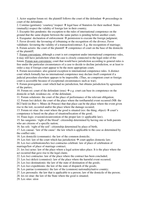1. Actor sequitur forum rei: the plaintiff follows the court of the defendant proceedings in
court of the defendant;
2. Comitas (gentium): ‘courtesy’/respect legal base of Statutists for their method. States
(mutually) respect the validity of foreign law in their country;
3. Exceptio litis pendentis: the exception to the rules of international competence on the
ground that the same dispute between the same parties is pending before another court;
4. Exequatur: declaration of enforcement permission to execute the foreign judgment;
5. Favor divortii: the favouring of (obtaining or the recognition of) the divorce; Favor
validitatis: favouring the validity of a transaction/contract. E.g. the recognition of marriage;
6. Forum actoris: the court of the plaintiff competence of court on the base of the domicile
of the plaintiff;
7. Forum conveniens: although a court is not competent under international competence rules,
it may still have jurisdiction when the case is closely connected to the legal order of the
forum; Forum non conveniens: court that would have jurisdiction according to general rules is
free under the particular circumstances of a case to decide to decline jurisdiction, or at least to
order a stay if foreign court appear to be the more appropriate court;
8. Forum necessitates: also general exception to international competence rules. A distinct
court which formally has no international competence may declare itself competent if a
judicial procedure elsewhere appears to be impossible. (Thus, no competent court or foreign
court is accessible because of exceptional circumstances such as war);
9. Forum prorogatum: court which had no jurisdiction, but obtains jurisdiction by agreement
of the parties;
10. Forum rei: court of the defendant (reus) e.g. court can base its competence on the
domicile or hab. residence etc. of the defendant;
11. Forum solutionis: the court of the place of performance of the relevant obligation;
12. Forum loci delicti: the court of the place where the tort/harmful event occurred (NB: the
ECJ held (in Bier v. Mines de Potasse) that that place can be the place where the event given
rise to the tort, occurred and/or the place where the damage occured;
13. Forum rei sitae: the court where the good is situated (res: the thing, object) court’s
competence is based on the place of situation/location of the good;
14. Fraus legis: evasion/circumvention of the proper law (= applicable law);
15. Ius sanguinis: ‘right of the blood’: citizenship determined by having one or both parents
who are citizens of a specific nation;
16. Ius soli: ‘right of the soil’: citizenship determined by place of birth;
17. Lex causae: ‘law of the cause’: the law which is applicable to the case as determined by
the conflict rule;
18. Lex domicilii (communis): the law of the common domicile;
19. Lex fori: law of the court which has jurisdiction court applies domestic law;
20. Lex loci celebrationis/lex loci contractus celebrati: law of place of celebration of
marriage/law of place of marriage contract;
21. lex loci actus: law of the place where a legal action takes place. It is the place where the
act occurred that gave rise to the legal claim;
22. Lex loci contractus: law of the place where the contract has been concluded;
23. Lex loci delicti (commissi): law of the place where the harmful event occurred;
24. Lex loci destinationis: the law of the state of destination of the goods;
25. Lex loci expeditionis: the law of the state of dispatch of the goods;
26. Lex patriae (communis): the law of the (common) nationality/native country;
27. Lex personalis: the law that is applicable to a person; law of the domicile of the person;
28. lex rei sitae: the law of the State where the good is situated;
29. Lex situs: idem
court of the defendant;
2. Comitas (gentium): ‘courtesy’/respect legal base of Statutists for their method. States
(mutually) respect the validity of foreign law in their country;
3. Exceptio litis pendentis: the exception to the rules of international competence on the
ground that the same dispute between the same parties is pending before another court;
4. Exequatur: declaration of enforcement permission to execute the foreign judgment;
5. Favor divortii: the favouring of (obtaining or the recognition of) the divorce; Favor
validitatis: favouring the validity of a transaction/contract. E.g. the recognition of marriage;
6. Forum actoris: the court of the plaintiff competence of court on the base of the domicile
of the plaintiff;
7. Forum conveniens: although a court is not competent under international competence rules,
it may still have jurisdiction when the case is closely connected to the legal order of the
forum; Forum non conveniens: court that would have jurisdiction according to general rules is
free under the particular circumstances of a case to decide to decline jurisdiction, or at least to
order a stay if foreign court appear to be the more appropriate court;
8. Forum necessitates: also general exception to international competence rules. A distinct
court which formally has no international competence may declare itself competent if a
judicial procedure elsewhere appears to be impossible. (Thus, no competent court or foreign
court is accessible because of exceptional circumstances such as war);
9. Forum prorogatum: court which had no jurisdiction, but obtains jurisdiction by agreement
of the parties;
10. Forum rei: court of the defendant (reus) e.g. court can base its competence on the
domicile or hab. residence etc. of the defendant;
11. Forum solutionis: the court of the place of performance of the relevant obligation;
12. Forum loci delicti: the court of the place where the tort/harmful event occurred (NB: the
ECJ held (in Bier v. Mines de Potasse) that that place can be the place where the event given
rise to the tort, occurred and/or the place where the damage occured;
13. Forum rei sitae: the court where the good is situated (res: the thing, object) court’s
competence is based on the place of situation/location of the good;
14. Fraus legis: evasion/circumvention of the proper law (= applicable law);
15. Ius sanguinis: ‘right of the blood’: citizenship determined by having one or both parents
who are citizens of a specific nation;
16. Ius soli: ‘right of the soil’: citizenship determined by place of birth;
17. Lex causae: ‘law of the cause’: the law which is applicable to the case as determined by
the conflict rule;
18. Lex domicilii (communis): the law of the common domicile;
19. Lex fori: law of the court which has jurisdiction court applies domestic law;
20. Lex loci celebrationis/lex loci contractus celebrati: law of place of celebration of
marriage/law of place of marriage contract;
21. lex loci actus: law of the place where a legal action takes place. It is the place where the
act occurred that gave rise to the legal claim;
22. Lex loci contractus: law of the place where the contract has been concluded;
23. Lex loci delicti (commissi): law of the place where the harmful event occurred;
24. Lex loci destinationis: the law of the state of destination of the goods;
25. Lex loci expeditionis: the law of the state of dispatch of the goods;
26. Lex patriae (communis): the law of the (common) nationality/native country;
27. Lex personalis: the law that is applicable to a person; law of the domicile of the person;
28. lex rei sitae: the law of the State where the good is situated;
29. Lex situs: idem



